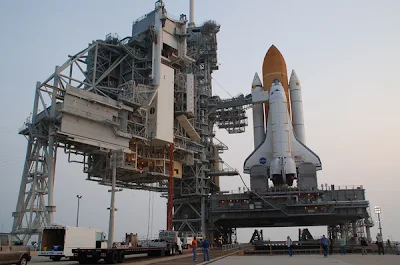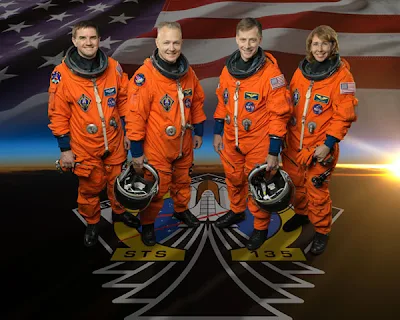Atlantis launch a bittersweet end for space shuttle
For tens of thousands of past and present shuttle workers, including more than 3,000 expecting layoffs July 22, the traditional "wheels stopped" call when the space shuttle Atlantis returns to Earth will signal the end of an era.
Atlantis is scheduled to take off at 11:26 a.m. ET today, weather permitting, on NASA's final shuttle mission after three decades and more than 130 flights, with a landing at the Kennedy Space Center set for July 20.
"After the wheels have stopped and the displays go blank and the orbiter is unpowered for the final time...there will be a rush of emotion when we all finally realize that's it, that it's all over, the crowning jewel of our space program, the way we got back and forth from low-Earth orbit for 30 years...we'll realize that's all over," said shuttle commander Christopher Ferguson. "That's going to take a little while to deal with it."
Atlantis' landing will come seven-and-a-half years after President Bush, responding to the 2003 Columbia disaster, ordered NASA to complete the International Space Station and retire the space shuttle fleet by the end of the decade.
When all was said and done, the final two shuttle missions slipped into the first half of 2011 and a third flight, with Atlantis, was added to the manifest to deliver a final load of supplies to the space station.
The Bush administration's plan was to eliminate the costly shuttle program--and the thousands of contractor jobs that made it so expensive--and use the savings to help pay for a new program, building safer, lower-cost rockets needed to support the establishment of Antarctica-style bases on the moon by around 2020.
But Bush never fully funded his Constellation moon program--he barely mentioned it after the initial 2004 announcement at NASA headquarters--and the Obama administration decided in 2009 that it was simply too expensive.
Writing off nearly $10 billion spent on initial design and development of the Constellation moon program rockets and infrastructure, President Obama settled on a controversial new plan that marked a drastic change of course for NASA.
The so-called "flexible path" approach calls for the near-term development of private-sector spaceships to ferry astronauts to and from the space station on a for-profit basis while NASA focuses on designing new, more affordable rockets and spacecraft for eventual voyages to nearby asteroids, the moons of Mars, or even the red planet itself.
"By investing in groundbreaking research and innovative companies, we have the potential to rapidly transform our capabilities...for future missions," Obama said during a visit to the Kennedy Space Center in 2010. "And unlike the previous program, we are setting a course with specific and achievable milestones.
"Early in the next decade, a set of crewed flights will test and prove the systems required for exploration beyond low-Earth orbit. And by 2025, we expect new spacecraft designed for long journeys to allow us to begin the first-ever crewed missions beyond the moon into deep space. We'll start by sending astronauts to an asteroid for the first time in history. By the mid-2030s, I believe we can send humans to orbit Mars and return them safely to Earth. And a landing on Mars will follow. And I expect to be around to see it."
But those flights are little more than long-range dreams at this point. The heavy-lift rocket needed to boost such missions into deep space has not yet been designed and test flights are years away as are initial flights of commercial manned spacecraft intended to service the space station.
In the near term, for the next four to six years, U.S. astronauts and their international partners will be forced to hitch rides on Russian Soyuz spacecraft, at about $60 million a seat, for trips to and from the International Space Station.
"Does it bother me? I think the transition could have taken place a little more gradually," Ferguson said of the Obama space policy. "I would have liked to have seen a little more openness and not have it occur so suddenly. Does that mean it's the wrong thing to do? I'm really not sure. We had alluded to, in the past, we're really taking a risk. We are. And with big risks come big rewards. This could turn out to be the savior of human spaceflight in America. I'm really not sure, only time will tell.
"I do think we are kind of hanging it out a little bit," he said. "But I'm optimistic about the future and in the interim, we have our Russian partners. They'll get us up and down, we're paying customers, and they're good to their word."
A giant leap backward?
But reliance on NASA's former Cold War rival has been a particularly bitter pill to swallow for many at NASA, forced to retire the most sophisticated manned spacecraft ever built before a U.S. replacement is available. Equally devastating, in the eyes of many, is the loss of manned spaceflight experience as thousands of highly skilled aerospace jobs are eliminated.
"We are going to miss it," former NASA Administrator Mike Griffin, architect of the Bush administration's moon program, said of the shuttle program. "I was, as administrator, supportive of and willing to retire the shuttle in favor of a new and better system that would take us back to the moon and even beyond, but I'm not willing to retire the shuttle in favor of nothing. That, to me, doesn't seem like good national policy."
In the near term, "we're going to have a reverse brain drain," he told CBS News. "It used to be that people came from other places and other industries to work in the space program because of what it meant and what it was. And as it goes away, we're going to lose those people because talented folks go where there are tough problems. And that's not going to be good for the country."
NASA's current administrator, former shuttle commander Charles Bolden, believes the new approach, unlike the Constellation moon program, is sustainable and the right path forward in an era of tight budgets and more limited horizons.
"Some say that our final shuttle mission will mark the end of America's 50 years of dominance in human spaceflight," Bolden said in a recent speech. "As a former astronaut and the current NASA administrator, I want to tell you that American leadership in space will continue for at least the next half-century because we have laid the foundation for success--and here at NASA, failure is not an option."
There's a widely held belief among Apollo veterans that NASA's new marching orders are a step back. In an open letter to the president, Apollo 11 commander Neil Armstrong, Apollo 13 commander James Lovell, and Apollo 17 commander Eugene Cernan said America is on the verge of giving up its leadership in space.
"For the United States, the leading space-faring nation for nearly half a century, to be without carriage to low Earth orbit and with no human exploration capability to go beyond Earth orbit for an indeterminate time into the future, destines our nation to become one of second or even third rate stature," they wrote. "While the president's plan envisages humans traveling away from Earth and perhaps toward Mars at some time in the future, the lack of developed rockets and spacecraft will assure that ability will not be available for many years.
"Without the skill and experience that actual spacecraft operation provides, the U.S. is far too likely to be on a long downhill slide to mediocrity. America must decide if it wishes to remain a leader in space. If it does, we should institute a program which will give us the very best chance of achieving that goal."
Layoffs loom as NASA changes course
As NASA's fortunes have waxed and waned, buffeted by political upheaval, an economic crisis and uncertain public support, the one constant has been the shuttle's looming retirement and the slow but steady elimination of the program's highly skilled workforce.
In 2006, about 14,000 contractors and 1,800 civil servants worked on the shuttle program, most of them in Florida, Texas, and Alabama. Going into the Atlantis launch campaign, the contractor workforce had been reduced to 5,615. Half of the remaining employees will be laid off after landing.
"Right now, we're down to those required just for sustaining engineering and operation of the last flight, so it's about 5,500 contractor employees spread across Texas, Utah, Louisiana, Alabama, Florida," said shuttle Program Manager John Shannon. "And a little bit under 1,200 civil servants, so we're at about 6,700 total people working in the shuttle program.
"The big layoff is really right after the shuttle landing and then we will keep some people in Florida for down-mission processing. So on July 22, if we launch on July 8, there will be a significant loss, about 3,200 contractors. There are other layoffs in August for all of our prime contractors and the subs, so they will go into the transition-retirement, which is just the configuration of the vehicles and the dispositioning of hardware. That's under 1,000 people total. That's where we are right now and where we should be in a month and a half."
When Atlantis returns to Earth later this month, hundreds of engineers, technicians, astronauts, and NASA managers will be standing by to welcome Atlantis and its crew home and to "share the moment" as the shuttle program comes to an end after three decades.
"The landing task, you are hyper focused on getting Atlantis back safely," said pilot Douglas Hurley. "But I'm really looking forward, after they pry all four of us out of the orbiter, to just get down and share that moment with the folks who have literally been here since the first orbiter showed up, to be on the runway with them...and just kind of share those memories."
Added space station veteran Sandra Magnus, another of the four crew members on this final flight: "It's going to be very sad. I told Fergie, I'm probably going to be crying when we land just because it's just so sad!"
"The shuttle's given so much to the country," she said. "When you look at the different kinds of missions it can do, it built the space station, it's done science missions that ranged from taking the Spacelab up to the big radar missions we've done, it's done astronomy, it's done biological science, materials science and then it's done satellite deploy, repair and retrieve. It's an incredible legacy this vehicle has given us. And while we do have to retire it, it's still going to be very sad to see it go."
Read more: http://news.cnet.com/8301-11386_3-20077756-76/atlantis-launch-a-bittersweet-end-for-space-shuttle/#ixzz1RWaOze6K













No comments: